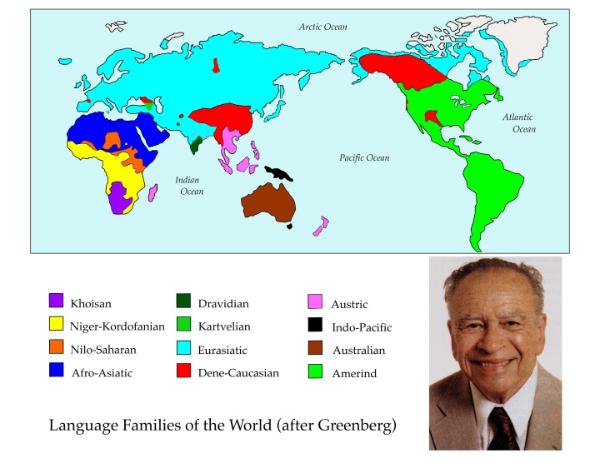
Department of Anthropological Sciences
Stanford University
e-mail: merritt at merrittruhlen.com
Amerind Dictionary
Publications
Guidelines for Writing a Research Paper
Words Borrowed from American Indian

Linguistically, I study language classification and genetic links. I'm interested in language family beginnings and shared ancestors. My research suggests a genetic and typological approach to language classification instead of geographical closeness.
As a linguist, my research is focused on understanding the intricacies of language:
My proposal of the Proto-World language, the ancestor of all human languages, is one of my most important contributions to the discipline. I believe this hypothesis is essential to understanding language and human history, notwithstanding its controversy. We can learn about human cultures and languages by comparing languages. I study language genetics. To compare languages' grammar, lexicon, and sound systems. These similarities and contrasts help us identify language families with a common ancestor. These language families can be organized into super-families, revealing regional linguistic history.
Writing system history and culture development fascinate me. We can better comprehend the intricate relationships between language, society, and technology by studying writing systems and their cultures. If you are stuck and need help writing or editing your research paper, you can easily acquire help writing papers at trusted online resources, just write them what your problem is.
When I sit down to write my research paper, I have high hopes that the findings of my study will have practical implications in academic disciplines such as linguistics, anthropology, and the study of the history of humankind.
We can gain a better understanding of the variety and complexity of human languages, as well as the ways in which they have developed over the course of history, if we can discover the genetic ties that exist between different languages. In addition, we can obtain insights into the social, political, and economic forces that have molded our world by studying the cultural and linguistic development of human civilizations. This can be done through the study of the history of human societies.
When I write research papers, one of my goals is to make linguistics understandable and interesting to readers from a variety of backgrounds. My books and articles are written with the intention of making this intricate subject approachable to readers from a variety of different backgrounds since I am of the opinion that everyone can gain something from an understanding of language and the process by which it has developed.
Finding out how much we can understand about different cultures by looking at their writing systems has been one of the most fascinating aspects of my research. Did you know that the Chinese script has maintained a substantial part of its original form for more than 3,000 years? This demonstrates the tenacity and adaptability of Chinese culture, which has persisted through millennia of turbulent political and social change.
In a similar vein, the evolution of the Arabic alphabet provides fascinating insights into the propagation of Islam and the growth of Islamic culture. Arabic's development into a literary language across North Africa, Spain, and even parts of Asia contributed to the establishment of a common cultural heritage that continues to bring together millions of people in different regions of the world.
Obviously, not all methods of written communication are as durable or significant as others. For example, the meaning of the Mayan hieroglyphs was not rediscovered until the 20th century, after they had been misunderstood for nearly a thousand years. In spite of the fact that they have been relatively forgotten in modern times, they are a vital source of information regarding the advanced intellectual and mathematical accomplishments of ancient Mesoamerican cultures.
Our comprehension of human history and experience can be deepened and widened if we take the time to investigate a variety of writing systems and the cultural circumstances in which they were developed. I have high hopes that the findings of my research will contribute to a broader global respect for the linguistic and cultural diversity that exists.
I also studied language universals, which all human languages have. These universal qualities reveal language acquisition and cognitive processes.
This research affects:
Anthropology, genetics, archaeology, and psychology inform my linguistics approach. I think a broad view of human evolution—biological and cultural—is needed to understand language.
I have taught and worked with international linguists and intellectuals. I worked with researchers from varied language and cultural backgrounds at major universities in Europe, Asia, and Oceania as a visiting professor. These encounters have broadened my understanding of language and its evolution and deepened my admiration for the complexity and diversity of human civilizations.
I'm a linguist. Language evolves, and there is much to learn about its origins, history, and cultural relevance. I'm excited to share my linguistics knowledge.
Linguistic interdisciplinarity excites. Language is essential to culture and communication, hence it touches many areas. Geneticists, anthropologists, and psychologists collaborated. Combining views improves language and culture comprehension.
Linguists must also use scientific methods and be grounded in facts. Linguistics has advanced with technology and data analysis. We need to enhance our methods and test our beliefs with evidence.
I hope linguistics evolves and recognizes language's relevance in our globalized society. Language's origins and evolution will help us understand human civilizations' richness and complexity.
While I do my research, I also enjoy sharing my insights with others and helping to inspire a new generation of linguists. I have taught courses on linguistics and language history at several universities, and I have also written several books on the subject for a general audience. My goal is to make linguistics accessible and engaging for everyone and to help others appreciate the fascinating complexity of human language and its evolution.
I find that encouraging other linguists and sharing my own views enhances my research experience.
I have written several general-audience books on linguistics and language history:
Among the many universities where I am currently on faculty include Stanford, Santa Fe Institute, and City University of Hong Kong. I want to make linguistics fun and interesting for everyone and show people how intriguing human language and its evolution are.
Finally, linguistics can help in language revitalization and preservation. Many languages and their cultural practices are threatened. We can understand language evolution by researching genetic links and linguistic universals. This information can help revitalize languages and maintain and appreciate our rich linguistic diversity.
Linguistics is a fascinating and dynamic science that can illuminate fundamental concerns about human language, society, and evolution. As a linguist, I aim to improve our understanding of these concerns through rigorous study, interdisciplinary collaboration, and public involvement. I look forward to exploring language's many facets and sharing my findings in the future.
